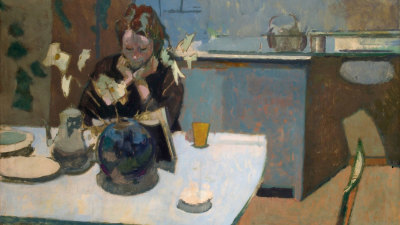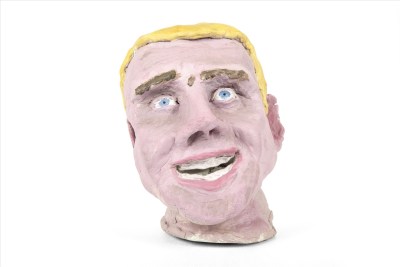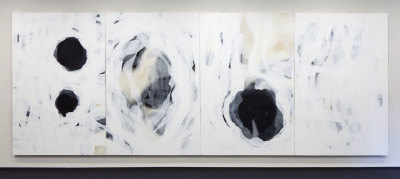‘In Tangier’: an extract from Tess Jaray’s new book
‘In Tangier’: an extract from Tess Jaray’s new book
By Tess Jaray
Published 27 November 2014
This short memoir is taken from painter Tess Jaray RA’s new book, ‘The Blue Cupboard: Inspirations and Recollections’.
-
There was only one place I wanted to stay. The Grand Hôtel Villa de France. The name resonated with grandeur and romance. It stood at the top of a hill overlooking the Mediterranean. This was the hotel in which Matisse had stayed for some three months in the spring of 1912, where he had painted some of the most sublime works of his career, in spite of almost daily rain. Of course I wanted to stay in room 35, his room, which I later saw was remarkably small for the birthplace of such masterpieces as The Casbah Gate and Landscape Viewed from a Window (below). For some reason that wasn’t possible, although I got a clue as to why when we had to try five rooms before we found one whose door locked or light worked. To ask for running water seemed excessively demanding. There was a telephone, but it only took incoming calls.
I could have left and gone to one of those nice tourist hotels with mod cons and en suite everything, but that seemed self-indulgent. In any case, I wanted the view from my window that Matisse had enjoyed.
-

Henri Matisse, Landscape Viewed from a Window, 1913.
Credit: Pushkin Museum, Moscow, Russia. © Succession H. Matisse/ DACS 2014. Photo: Bridgeman Images.
-
I got it. The same palm tree, grown much larger of course, and the same little English church – St Andrew’s, I seem to remember – that he painted several times. I was very happy. I didn’t mind that in this grandly named hotel, set among palm trees and bougainvillea, with exquisite though dilapidated tiled fountains still dripping a little water, and a swimming pool, overgrown with greenery, that had clearly not seen a swimmer since Matisse was there, absolutely nothing worked.
Having finally secured a room and fallen fast asleep, I was woken at three in the morning by the single light that worked and found myself staring into the face of a strange man. ‘Excuse me,’ he said in French, ‘I was looking for my wife.’ The next morning I realised that there was an unlocked door leading to the neighbouring room, and that it was perfectly clear that his wife was the very last person he was looking for. As there were no curtains, of course, I had been sleeping with a mask, so perhaps he thought I was Dick Turpin and took fright.
I was the only person at breakfast in the morning, which was served (served? Rather, brought in) in the grand dining-room by an agitated young man. Marvellous silk curtains, gossamer thin with time and neglect, framed the crumbling windows, and brocade-covered chairs, a few gold threads still clinging to them, were set around the tables. The tablecloths were made of that fine white linen that you don’t find anywhere else, but they were threadbare. Imposing chandeliers hung from the ceiling. Sunlight poured through the patterned, thick-glass windows in rays of diffused colour, and the floors were tiled with old patterned tiles that were warm to look at and cool to the touch.
There was certainly no sign that Matisse had ever stayed in the Grand Ho?tel Villa de France, and I found it very hard to imagine him setting out in the morning, formally dressed, carrying his painting materials and a little stool to sit on, the one that we know about because he drew it several times. Altogether the place was fairly empty, and there was a somewhat strange atmosphere. I was regarded with curiosity by the people in charge, and there seemed to be very few other visitors. I stayed for a week and got to know the wonderful, seedy, decaying city, with its rich history – remnants of the 1930s, ’40s and ’50s, when it was an international and financial refuge for English and American bohemians, and the building in which Paul Bowles was still living, although well into his eighties by then, and his playmate Jane long gone.
On my last day I packed and waited for a taxi to take me to the airport. I sat in the lobby with a handful of other people reading newspapers or staring into space. I noticed a girl sitting alone, wearing a djellaba and with her head veiled. In spite of the coverings, I could see that she was both very young and very pretty. Then suddenly, as if from nowhere, the same young man who had served me at breakfast sidled up to her, glanced around to make sure that no one was looking, and bent down to whisper something to her. She then got up and disappeared.
In my naïvety I simply hadn’t seen what was now clear as daylight: I had been staying in a brothel. No wonder the man who had entered my room in the middle of the night had looked so peeved. What would Matisse have thought?
The following year I returned to discover that the hotel was shut and locked. By now I imagine that it has been pulled down, its Art Deco fittings and crystal chandeliers sitting for sale in the souk, replaced by a proper modern building with all the personality of a bent hairpin.
The Blue Cupboard: Inspirations and Recollections £16.95, RA Publications.
Watch a video of Tess Jaray reading another story from the same collection.




